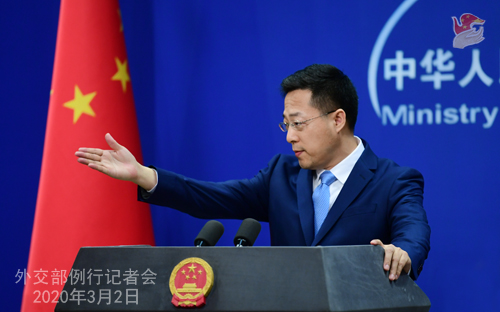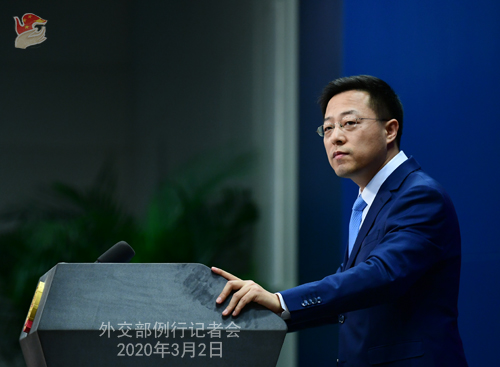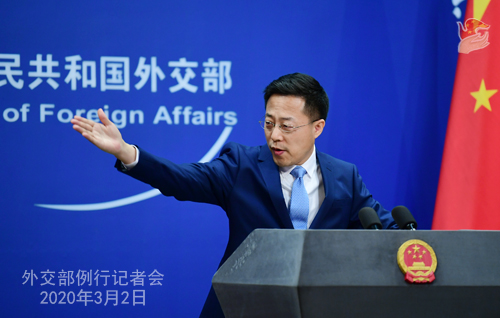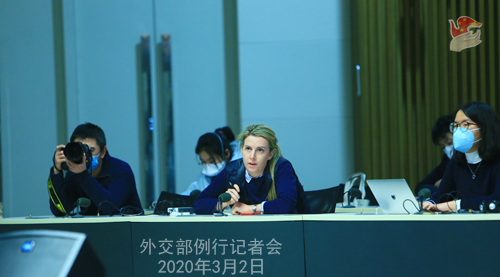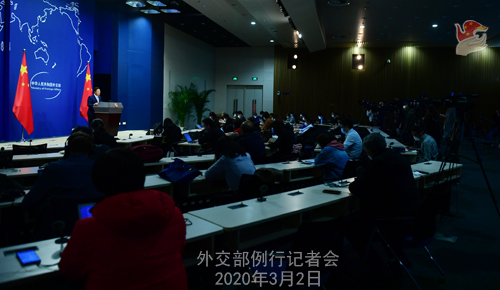| Foreign Ministry Spokesperson Zhao Lijian's Regular Press Conference on March 2, 2020 |
| 2020-03-02 22:54 |
|
I'd like to share with you some latest figures. According to the statistics from the National Health Commission this morning, March 1 saw 2,837 patients cured and discharged from hospital in China's mainland, bringing the tally to 44,462. Over the past week, the cure rates of confirmed cases in Wuhan city, Hubei province, and the country as a whole have kept rising. The ratio of discharged cases has exceeded 50% across the country, showing effectiveness of medical treatment. Since the epidemic broke out, the whole country is waging a united battle against it with the most comprehensive, rigorous and thorough measures. Thanks to these arduous efforts, the situation is increasingly trending in a positive direction and the recovery of economic and social development is being expedited. We are confident that we can and will win the fight. That being said, we need to be aware that the situation remains severe and complicated, with high uncertainty and strong pressure of a rebound. We will work relentlessly to implement every prevention and control measure to consolidate current results. Q: On February 28, WHO Director-General Tedros Adhanom Ghebreyesus announced that the WHO has increased its assessment of the risk of COVID-19 in terms of spread and impact to very high at a global level. How does China see the overseas spread of the virus? A: We have noted relevant reports. China is closely following the global developments of the COVID-19 epidemic. We relate to the difficulties some countries are going through as the situation there is getting more severe. The virus is a common challenge for humanity which calls for the joint response by the international community. Upholding the spirit of a community with a shared future, China will work actively with other parties at regional and global levels and participate more in international public health governance. We will also continue to work closely with the WHO and maintain close communication with relevant countries to share experience and coordinate response in a joint effort to safeguard regional and global public health security. Q: The US and the Taliban signed a peace deal in Doha, Qatar on February 29 local time. According to the agreement, the US will pull its troops out of Afghanistan in a phased manner and the Taliban promises not to shield terrorists. The signing of the deal marks an imminent end to the 18-year Afghan war. What is your comment? A: China welcomes the signing of this agreement between the US and Taliban, which we believe will play a positive role in promoting a political settlement of the Afghan issue. China firmly supports a broad and inclusive peace and reconciliation process that is "Afghan-led and Afghan-owned". We hope that the agreement between the US and the Taliban will enable the seed of peace to take root in Afghanistan. Foreign troops should withdraw in an orderly and responsible way so that the situation in Afghanistan will experience a steady transition with no security vacuum for terrorist forces to seize upon and expand themselves. Meanwhile, the international community should continue to support and engage in the Afghan peace and reconstruction process. China calls on the Taliban and other parties in Afghanistan to act upon this opportunity and launch intra-Afghan negotiations at an early date so that they can together make political and security plans that are acceptable to all and contribute to the realization of enduring peace and stability in Afghanistan. China stands ready to work with the international community and continue to offer our support and assistance to the peace and reconciliation process in Afghanistan. Q: The US State Department Spokesperson expressed concerns in a recent statement over the arrest of Jimmy Lai and others by the Hong Kong police. I wonder if you have a comment? A: With human rights and freedom as pretexts, the US blatantly intervenes in Hong Kong's rule of law and judicial independence and flagrantly interferes with its affairs. We deplore and reject this. We urge the US to respect Hong Kong's rule of law and judicial independence, stop endorsing anti-China Hong Kong disruptors or meddling in China's domestic affairs including those related to Hong Kong, and instead contribute to its stability and prosperity.
Q: On the same day that the US and the Taliban signed the peace deal, the Afghan and US governments issued a joint declaration in Kabul. What is your comment? A: On February 29, the Afghan government and the US signed a joint declaration in Kabul on the US-Taliban peace deal. Representatives of foreign diplomatic missions in Afghanistan, including the Chinese side, and some international and regional organizations attended the signing ceremony upon invitation. China consistently and firmly supports a broad and inclusive peace and reconciliation process that is "Afghan-led and Afghan-owned". We support the Afghan government, the Taliban and other parties in Afghanistan in launching and advancing their intra-Afghan negotiations at an early date. China will continue to be a supporter, mediator and facilitator of the Afghan peace and reconciliation process and play a constructive role on the basis of respecting the wishes of all parties in Afghanistan. Q: Many localities in China have strengthened their prevention and control measures on foreigners entering China. What is your comment? A: Considering the current circumstances and the local needs for epidemic prevention and control, examination, quarantine and other prevention and control measures have been taken for people coming from countries and regions with grave epidemic situation, like temperature checks, quarantine at home or medical observation at designated places. These measures accord with Chinese laws and regulations. As a necessary part of our prevention and control measures, they are effective in stemming the cross-border spread of the virus and conducive to prevention and control efforts in China and other countries as well. As the epidemic situation evolves, local governments in China will adjust their measures on foreigners after their entry accordingly. We treat Chinese and foreign nationals alike. We will implement these measures without any discrimination, take full consideration of the legitimate concerns of the persons involved and offer them necessary guarantees and assistance. The measures China has taken against the epidemic have effectively slowed down its spread, contained human-to-human transmission, and won well-deserved recognition from the WHO. We hope that we can have the full understanding and cooperation of those coming from countries severely affected by the epidemic. Altogether we should guard against the relevant risks and protect the health and safety of ourselves and those around us. Q: Director Yang Jiechi of the Office of the Foreign Affairs Commission of the CPC Central Committee paid a visit to Japan and co-chaired the eighth China-Japan high-level political dialogue. Do you have more to share about the outcomes of the visit? Did the two sides reach any agreement on President Xi Jinping's visit to Japan? A: During his stay in Japan, Director Yang Jiechi met with Japanese Prime Minister Shinzo Abe. He also co-chaired the eighth China-Japan high-level political dialogue along with Secretary General of Japan's National Security Secretariat Shigeru Kitamura and met with Foreign Minister Toshimitsu Motegi. The two sides exchanged views on bilateral relations, joint efforts against COVID-19 and other issues of mutual concern. You may check on the press release we issued. I want to add that the China-Japan relationship is developing with a sound momentum. China stands ready to work with Japan to implement important consensus reached between the two leaders, follow the spirit of mutual respect and seeking common ground while shelving differences, and jointly promote a bilateral relationship consistent with the needs of the new era. President Xi Jinping's state visit to Japan carries great significance. China would like to stay in close communication with Japan to create enabling conditions and good atmosphere with the best possible preparations for the visit. In the face of the epidemic, China and Japan have assisted each other in overcoming difficulties. This has injected new impetus into the friendship between the two countries. China will remain in close communication with Japan and the broader international community to share experience, coordinate epidemic prevention and control measures and protect the health and well-being of people in the two countries and around the world.
Q: Two questions. The first one, the annual report of the Foreign Correspondents' Club of China found that working conditions for foreign journalists in China have declined. Do you have any response to this report? And the second question, the Australian Strategic Policy Institute said China is transferring Uighurs out of vocational education and training centers and into factories to serve as forced labor. Do you have any response to this? A: Regarding your first question, I need to stress that we never recognize the organization you mentioned. It is so inappropriate and unwise for it to comment with secret prejudice at this particular timing. We always welcome foreign media's objective and comprehensive coverage of China and have always supported and facilitated their work in accordance with laws and regulations. At the same time, permanent offices of foreign media and foreign journalists in China must abide by Chinese laws, regulations and decrees and observe their professional ethics. This is the same everywhere in the world. As to your second question, what it said is simply baseless. It is just another fabricated and biased accusation on Xinjiang by this institution to show its allegiance to the anti-China forces in the US and smear China's counter-terrorism and de-radicalization measures in Xinjiang. Such measures are taken in accordance with law and have produced good outcomes and won approval and support of all ethnic groups living in Xinjiang. All trainees who received education and training for de-radicalization purposes have graduated, found stable jobs with the help of the government and are living a happy life. I need to point out that the institution you mentioned, as revealed by an article written by some in Australia, is funded by the US government and arms dealers and enthusiastic about cooking up and sensationalizing anti-China topics. It is so imbued in ideological prejudice that it has become the "vanguard", which leads to serious doubt on its academic integrity. Once again, we urge certain organizations and individuals in Australia to stop hyping up Xinjiang-related issues. We also hope the media will stay vigilant, sharpen their eyes, abide by professional ethics and report their stories based on facts. Q: According to reports, the 53rd session of the Arab Council of Health Ministers convened at the Arab League headquarters in Cairo on February 27 issued a statement expressing appreciation and support for China's fight against the COVID-19 epidemic. I wonder if you have a response? A: The 53rd session of the Arab Council of Health Ministers issued a statement to express appreciation and support for China's efforts to combat the epidemic. It spoke highly of China's openness and transparency in cooperation and measures taken in accordance with WHO advice. We appreciate this. Since the outbreak of the epidemic, Arab countries have stood firmly with China. Many state leaders and the secretary-general of the Arab League sent messages and called us in support of China's fight. Governments and peoples of many Arab countries offered assistance to us. This demonstrates our traditional friendship and the high level of our strategic partnership. Going forward, we will continue to work with Arab countries and the international community to enhance cooperation, share experience and contribute to global public health.
Q: We noted that Iran and Italy have seen a significant increase in the number of confirmed COVID-19 cases and deaths. State Councilor Wang Yi spoke by telephone with foreign ministers of both countries over the weekend. Could you give us more information? Does China plan to provide assistance to the two countries? A: You may refer to the press releases of State Councilor and Foreign Minister Wang Yi's phone calls with Iranian and Italian foreign ministers. What I want to say here is that when the epidemic broke out in China, both Iran and Italy expressed sympathy and support to China. What they did demonstrates what it means to stand together in times of adversity and we will never forget that. We certainly relate to what the Iranian and Italian people are going through at the moment and expresses sincere condolences to them. China is ready to provide assistance as its capacity allows in terms of prevention and control of the epidemic and medical treatment in light of the needs of Iran and Italy. As I understand the Chinese side has urgently donated nucleic acid testing kits and medical equipment to the Iranian side. A team of five experts from the Red Cross Society of China arrived in Tehran, capital of Iran, on February 29. We are ready to enhance communication with Italy in professional fields and exchange experience and technology in epidemic prevention and control. Q: Recently, some passengers who came to China from Russia or transited through Russia have contracted COVID-19. Has China informed Russia of this situation immediately? A: According to information released by epidemic prevention and control headquarters of relevant Chinese provinces and cities, several patients confirmed of COVID-19 infection transited through Moscow on their way back to China. China immediately informed Russia of this situation in an open, transparent and responsible manner. China will continue to strengthen cooperation on prevention and control efforts with Russia and the rest of the world to timely share information and overcome the challenges altogether. Q: According to the ROK defense ministry, the DPRK fired unidentified projectile on Monday. Does China have a comment on this? A: We noted relevant reports. Under current circumstances, China calls on relevant parties to demonstrate flexibility to each other, remain committed to resolving differences through dialogue, and work for denuclearization on the Korean Peninsula and lasting peace on the Peninsula and in the region. Q: I understand that China doesn't recognize the FCCC, but the report is based on a survey of foreign journalists in China. I'm wondering does the Chinese foreign ministry have any recommendation to journalists about how they can avoid the same visa situation faced by the Wall Street Journal reporters? A: I already stated China's position. What happened with regard to the Wall Street Journal reporters are only rare cases. The journal should draw lessons from it. There are more than 600 foreign correspondents in China. So long as they comply with Chinese laws and conduct coverage within the boundaries of laws and regulations, there is no cause for concern whatsoever.
|
| |||||||||||||||
|
|||||||||||||||


